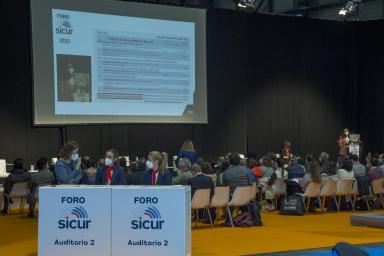

In emergencies, interventions must ensure operational security, according to speakers at SICUR
The vice president of Tecnifuego highlighted the importance of remote management in fire protection.
The president of ASELF asked for the participation of every actor involved in the world of safety and security in order to increase the "value added" The Madrid Firefighters Official assured that qualified information helps predict needs and foresee resources in an actuation
Emergency interventions should ensure operational and operative safety by controlling the tasks and environment where the emergency occurs, as experts warned at a SICUR workshop, the International Security Trade Fair organised by IFEMA MADRID held from February 22 to 25. Moreover, exhibitors affirmed that the fire protection sector may increase the effectiveness of the detection and alarm systems making use of the information they generate.
Participants at the encounter on Security and Safety in interventions in emergencies" organized by the Spanish Firefighting Association (ASELF) included Pablo Gárriz, President of ASELF; Antonio Tortosa, Vice President of the Spanish Association of Fire Protection Companies (Tecnifuego); and José Luis Legido, Officer of the City of Madrid Fire Department.
Legido referred to the close links between the concepts of "security, information, and intervention in emergencies", which can be "strengthened even more through technology". A tool that can multiply data on any action and introduce "reliable and suitable information" on the place of action, which provides major advantages.
The Officer of the City of Madrid Fire Department referred to the important role of command, organization, and control in interventions. He went on to explain that the preliminary information that reaches the emergency services when an accident occurs "is usually external and basic" but insufficient, so in needs to be complemented right away". Thus, more qualified information allows, among other matters, "anticipating needs and predicting the necessary resources, identifying and confirming the type of accident, detecting possible problems and indirect risks, and locating people at danger". All this can help determine the most appropriate strategy, "ensuring security and safety by controlling the tasks and the surroundings".
Alarm centres
The Vice President of Tecnofuego, Antonio Tortosa, highlighted the importance of managing fire signals for emergencies and emphasised the need and future of remote management. "In the FP (fire protection) sector, the next step to achieve full efficient detection and alarm systems is to process and manage the information they already generate but that goes unused".
He therefore stated that "ongoing supervision, improved maintenance and optimisation and improvement in the intervention times are only some of the possibilities it offers". He concludes that "remote management of FP systems is therefore a need and a social demand to solve problems that had never been possible to solve until now and involve considerable savings to companies and administrations".
Finally, the President of ASELF asked for the participation of all the actors related to the world of security to give greater "value added" to the entire chain in the sector. "Citizens make an effort to protect themselves and their assets by investing in security, and there are regulations, but society needs us all to act on this matter, doing our part to ensure safer and more prosperous societies". In this context, Gárriz affirmed that alarm suppliers have a very important job, since "quick detection and warning are fundamental".





